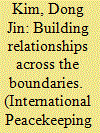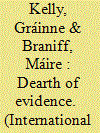| Srl | Item |
| 1 |
ID:
153690


|
|
|
|
|
| Summary/Abstract |
The expectations for the role of civil society are growing due to an abysmal record of high-level political leadership in reaching an agreement and a sustainable peace process. How much impact can civil society have and what roles can it take in the peace process? This case study of South Korean civil society shows how the civil society was able to bridge the horizontal and vertical boundaries of the Korean conflict with the support of a global civil society, and created a hospitable public atmosphere for the peace process in the 1980s and 1990s. However, the space for the civil society to make a contribution in the Korean peace process required the interdependency of the roles of high-level and civil-society leadership in the interplay between the international and domestic political environments. The peacebuilding role of South Korean civil society demonstrates that the horizontal capacity of civil society alone cannot guarantee a breakthrough and sustainability in a peace process, but if it is coordinated with the vertical capacity, civil-society peacebuilding can be a useful platform for sustainable peacebuilding.
|
|
|
|
|
|
|
|
|
|
|
|
|
|
|
|
| 2 |
ID:
145023


|
|
|
|
|
| Summary/Abstract |
Addressing the estrangement of distinct identity groups as a result of violent conflict is a challenging and persistent socio-psychological peacebuilding imperative. In the immediacy of a peace agreement, priority is given to pressing security and institutional arrangements, particularly within the context of substantial external intervention. Northern Ireland represents an interesting case study, as early and targeted attention was paid to the divisions between the two main communities in the region. And yet, despite substantial economic investment, the detail of how interventions aimed at addressing poor relations have been informed, designed and achieved has not been readily accessible. Focusing on grassroots-based relational and reconciliation processes, this article contends that the failure to document, analyse and adequately disseminate these approaches has resulted in community-level peacebuilding which is unnecessarily extemporary, and the focus on delivery has militated against cultures of learning, reflexivity and generosity in the sharing of good practice.
|
|
|
|
|
|
|
|
|
|
|
|
|
|
|
|